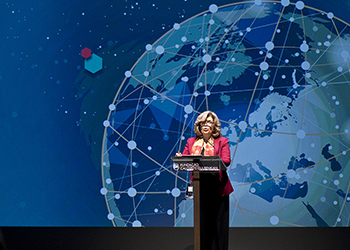Could social innovation “save” Europe?

Gathered at the Calouste Gulbenkian Foundation for the Social Innovation Lisbon Conference, co-organised with the European Commission and the Portuguese Government, experts called for larger scale on impact investment, an area which politicians perceive as holding potential for responding to the social challenges that threaten the future of Europe.
While a decade ago social innovation still remained “a marginal idea”, it today represents a theme able to bring together over 1,400 participants in a conference attended by the Portuguese President of the Republic and Prime Minister, two European Commissioners, three Ministers, two Municipal Council Presidents (Lisbon and Paris), two Secretaries of State, various leaders of civil society organisations, social entrepreneurs, philanthropists, venture capital investors and business angels.
Portugal stands out as one of the seven countries worldwide with public policies targeting the social innovation field and became a case study in the application of funding in this domain where the Calouste Gulbenkian Foundation has also played an important role as an investor. In opening this conference, Isabel Mota highlighted the number of Portuguese projects that have today gained widespread recognition and to the extent of replication at the international level. They have counted upon the support of the Calouste Gulbenkian Foundation right from the very outset when their scope of potential for success still remained largely unknown. “The risk paid off”, concluded the Foundation President, reaffirming how social innovation shall continue as a strategic priority, providing backing for projects applying technologies as a means to resolve social problems, alongside the role of artistic practices in processes of inclusion and as well as investing in the impact of new leadership in the social economy.
The Gulbenkian Foundation was thus the ideal host for the conference Opening Up to an Era of Social Innovation, “a milestone”, in the words of the European Commissioner Carlos Moedas, who came to demonstrate that social innovation has definitively entered the political agenda.
A systemic change
“The European Union strategy has to ensure that impact investment becomes mainstream” was the recommendation from Sir Ronald Cohen, a veteran of high finance and responsible for launching the first Social Impact Bond in the United Kingdom in 2010. “After the tech revolution, we need an impact revolution” Sir Ronald Cohen announced on a panel that shared agreement around the need for larger scale investment in social innovation projects and ensuring the measuring of the results returned. There was also talk of a systemic change: “Social innovation is part of the mindset of the younger generations”, highlighted Filippo Addari, a specialist in maximising social impact through innovative models for public goods. The same panel featured representation from the “millennial” generation with Joséphine Goube, aged 29, who runs the Techfugees platform. “We are a generation with social awareness who feels empowered to seek out solutions”, said the young social entrepreneur who, since 2015, has been a consultant to the European Commission on immigration issues. “I have witnessed great difficulties in achieving a consensus among nation-states over refugees. Hence, I think we should back the social entrepreneurs that were born in the Schengen Space, who do not consider themselves as from any country but rather European”. This was greeted with a round of applause in the Grand Auditorium.
The theme of refugees was one of those most present throughout the two days of this conference as was also the case with the ageing of the population. In 2060, almost a third of the European Union population shall be aged over 65, a level that “is almost double the current situation”, recalled the European Commissioner for Research, Science and Innovation, Carlos Moedas, when announcing the launch of the Horizonte Award for Social Innovation (applications open until 28 February), worth two million euros for the best means of improving the mobility of elderly citizens.
Carlos Moedas affirmed that “social innovation shall restore the sense of purpose to Europe”, a hope that echoed throughout the interventions of other politicians, including Jean-Claude Juncker in a pre-recorded speech and the Portuguese Prime Minister António Costa who highlighted the great challenge Europe currently faced in “responding to the fear, anxiety and the anguish that has come to feed the radicalisms, the xenophobia and protectionist temptations.” In this context, he stated, social innovation has a particularly important role as the bridge between science, creativity, entrepreneurship and people’s needs. Furthermore, Minister Maria Manuel Leitão Marques highlighted, “social innovation is not about the state shedding responsibilities” but rather a sustainable means of resolving social problems.
In her closing speech to the conference, the European Commissioner for Employment, Social Affairs, Skills and Labour Mobility, Marianne Thyssen, reinforced how social innovation is to transform Europe and advocated “modern social protection” for all citizens supported by the European Parliament and member states.
